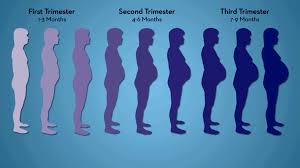
Vaginal bleeding can have different causes and needs to be treated accordingly.
What causes heavy bleeding during pregnancy?
The cause of vaginal bleeding during pregnancy depends on the period of gestation.
Bleeding during early pregnancy will have different causes as compared to the second or third trimester pregnancies.
Bleeding in Early Pregnancy (First Trimester):
Bleeding in the first trimester is a common occurrence but it can be an indication of serious conditions as well.
Implantation Bleeding – Typically defined as light spotting or bleeding that occurs about 10 to 14 days after conception, implantation bleeding is normal.
Implantation bleeding occurs when the fertilized egg attaches to the lining of the uterus.
“It is possible that some women don’t experience or don’t notice implantation bleeding. Usually this kind of bleeding does not require treatment.”
Will bleeding lead to Loss of Pregnancy?
Bleeding and cramping can be warning signs of early pregnancy loss, also known as a miscarriage.
Sometimes, a pregnancy does not develop well which leads to the formation of an unhealthy or abnormal embryo.
In such a situation, nature steps in and ends the pregnancy on its own, which triggers the bleeding, called a missed miscarriage.
It is important that you seek advice on your condition early. A threatened miscarriage doesn’t always lead to loss of pregnancy and half of the women are able to continue.
Ectopic pregnancy – A pregnancy that grows outside the uterus (womb) is an ectopic pregnancy, where the lining of the uterus may start to bleed.
In a normal pregnancy, the pregnancy grows and develops in the uterus. An ectopic pregnancy occurs when the pregnancy starts developing outside the uterus.
An ectopic pregnancy poses a serious risk to your health if not treated on time so early diagnosis is advised.
Bleeding in Second or Third Trimester Pregnancy:
Light bleeding could be an indication of inflammation or growths on the cervix, vulva, or vagina, while heavy bleeding during pregnancy can signal issues in the placenta.
Placenta previa – If the placenta is detected in the lower part of the uterus then the condition is called ‘placenta previa’.
“Low-lying placenta detected via ultrasound in early pregnancy may actually start to appear attached to upper parts of uterus as pregnancy grows.”
However, if the condition does not resolve itself then you may experience painless bleeding.
It is important you contact the hospital right away if you experience bleeding, contractions or pain.
Placental abruption – The placenta detaches from the wall of uterus before or during birth in placental abruption.
Complications like the baby not getting enough oxygen or loss of large amount of blood in the mother may occur if not detected and treated early.
Keep in mind that a small amount of blood-tinged discharge before the start of labour is a normal sign during delivery.
Vaginal bleeding before 37 weeks of pregnancy can also be a sign of preterm labour. Appropriate action during preterm labour is taken after taking you and your baby’s health into consideration.
Measures – like injection to stop bleeding during early pregnancy, or medication and routine checkups – can be taken to treat the cause of bleeding if advised by your doctor.
Early diagnosis is essential to rule out possible causes.